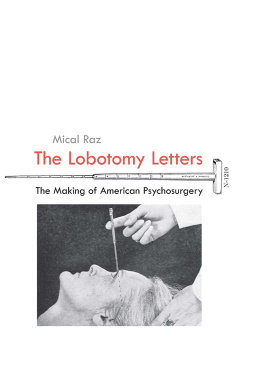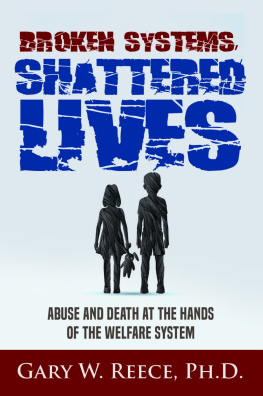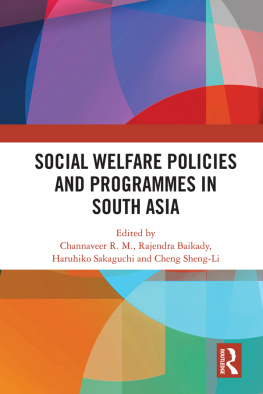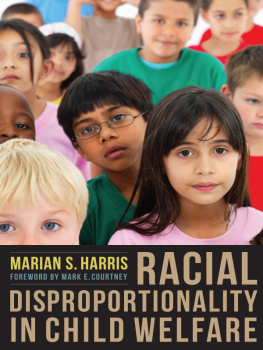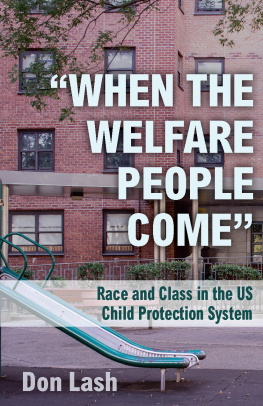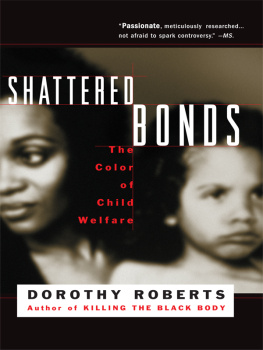STUDIES IN SOCIAL MEDICINE
Allan M. Brandt, Larry R. Churchill, and Jonathan Oberlander, editors
This series publishes books at the intersection of medicine, health, and society that further our understanding of how medicine and society shape one another historically, politically, and ethically. The series is grounded in the convictions that medicine is a social science, that medicine is humanistic and cultural as well as biological, and that it should be studied as a social, political, ethical, and economic force.
This book was published with the assistance of the Thornton H. Brooks Fund of the University of North Carolina Press.
2020 The University of North Carolina Press
All rights reserved
Set in Merope Basic by Westchester Publishing Services
Manufactured in the United States of America
The University of North Carolina Press has been a member of the Green Press Initiative since 2003.
Library of Congress Cataloging-in-Publication Data
Names: Raz, Mical, author.
Title: Abusive policies: how the American child welfare system lost its way / Mical Raz.
Other titles: Studies in social medicine (series)
Description: Chapel Hill : University of North Carolina Press, [2020] | Series: Studies in social medicine | Includes bibliographical references and index.
Identifiers: LCCN 2020018409 | ISBN 9781469661209 (cloth : alk. paper) | ISBN 9781469661216 (paperback : alk. paper) | ISBN 9781469661223 (ebook)
Subjects: LCSH Child welfareGovernment policyUnited StatesHistory20th century | Child abuseUnited StatePrevention | Child abuseReportingUnited States | Foster home careUnited States | Social work with African American childrenHistory20th century.
Classification: LCC HV741 2020 | DDC 362.760973
LC record available at https://lccn.loc.gov/2020018409
Cover illustration Prostock-studio/Alamy Stock Photo
Acknowledgments
Its an incredible privilege to acknowledge the many people who supported me throughout the journey of writing this book. The book is a reflection of the generosity of so many fabulous scholars, clinicians, and activists who have shared their experience and expertise with me.
This project started at the University of Pennsylvania, during my Robert Wood Johnson Clinical Scholars fellowship. I am particularly grateful to David Asch and Judith Long, who believe in the value of historical scholarship and its ability to inform policy making and consistently supported my research, despite it being an anomaly within the program. David Grande, Raina Merchant, Lucy Tuton, and countless other faculty members in the program offered wise advice and unwavering support. Marilyn Schapira and additional mentors and colleagues at the Veterans Administration Medical Center in Philadelphia supported my research during my year there as an advanced fellow, enabling me to spend the year in Virginia alongside my family. Thank you in particular to Stuart Gilman, Donald Richardson, and David Stern.
At Penn, I was lucky to have Robert Aronowitz as my primary mentor. Robby was exceedingly generous with his time and mentorship, offering wise comments, career advice, and personal support that made my life and work richer. Robbys enthusiasm and optimism are contagious, while his nuanced analyses always challenge my thinking. I had the good fortune to meet Dorothy Roberts while at Penn. A brilliant scholar whose groundbreaking research on child welfare and racial politics has shaped my work, as well as that of countless scholars, Dorothy was incredibly kind and gracious in sharing her insights with me.
During my time at Penn, I also benefited from discussions with pediatricians and child abuse experts, and I am particularly grateful to Desmond Runyon, Joanne Wood, Chris Feudtner, and Richard Krugman for sharing their ideas, particularly when they pushed me to engage with a wide spectrum of opinions and approaches. The amazing, strong women of DHS: Give Us Back Our Childrenspecifically Phoebe Jones, Pat Albright and Carolyn Hillshared stories of their activism in advocating for parents who lost custody of their children. Their important work shines a light on injustices within the child welfare system, and they helped put a human face on the cost of child removal in Philadelphia.
I was fortunate to be able to interview a number of child welfare experts and advocates from the 1960s and 1970s. Eli Newberger generously shared his recollections of his early clinical work in child abuse pediatrics and his perceptive interpretations of the fields trajectory. Stanley Murphy offered valuable insights on the legislative process. Robert Schwartz, David Lansner, Richard Steven Levine, and Joyce Mohamoud all took the time to answer my questions and shed light on child abuse advocacy in the early 1970s.
Naomi Rogers is my longtime mentor, steadfast supporter, role model, and friend. Naomi read every single word of this book at least once and offered detailed, handwritten comments. She is the ideal of an engaged scholar, an original thinker, and a passionate activist, and I hope to continue her legacy of mentorship with my students at the University of Rochester. Her generosity in mentorship knows no bounds, and I am thankful for my good fortune of having her in my life.
Friends and colleagues offered valuable support and feedback on this project. I am particularly indebted to my good friend Debbie Doroshow. As a fellow clinician and historian of child psychiatry, Debbie has been both a friend and a colleague for over a decade. She read earlier versions of the chapters, offered wise advice, and shared the ups and downs of our somewhat unusual path of training in both medicine and history. I am grateful to be able to rely on Debbie for good advice and dry humor even as I pester her with questions about footnotes. In Philadelphia, Jessica Martucci was a friend, neighbor, and colleague, who commented on my early work as it developed. Conversations with Matthew Gambino have shaped how I think about my work as well as about psychiatry. I am also grateful to my friends Rona Cohen, Noga Minsky, Suzanne Horwitz, Anna Morgan, Liliana and Andres Carrizo, and Crystal Ton, who sustained me throughout this project.
I presented some of this work at the Yale Child Study Center, and I am grateful to Jessica Wilen for hosting me, to the participants in the talk, and particularly to Linda Mayes, for her thoughtful comments on child abuse reporting in practice. Child welfare legal scholars Vivek Sankaran, Amy Mulzer, Emily Horowitz, and Diane Redleaf have enriched my thinking on the topic, and I am grateful for our conversations and correspondence.
A number of archivists and librarians offered invaluable research support during this project, and I am particularly grateful to Linnea M. Anderson at the Social Welfare History Archives at the University of Minnesota and to Eugene Mitchell at Alvernia University. Anna Amramina and Malena Mastel at the University of Minnesota provided excellent research assistance, and I am grateful for their diligent work.
At the University of North Carolina Press, I had the good fortune to work with Lucas Church, who has been a longtime supporter of this project. I am grateful for his expert guidance throughout the publishing process and for his vision in leading this book to the finish line. I am also grateful to Andrew Winters for his work on the manuscript. I am thankful to my two anonymous reviewers for their close reading and careful comments. Rio Hartwell helped push this book across the finish line, and I am grateful for his expert editing skills.



